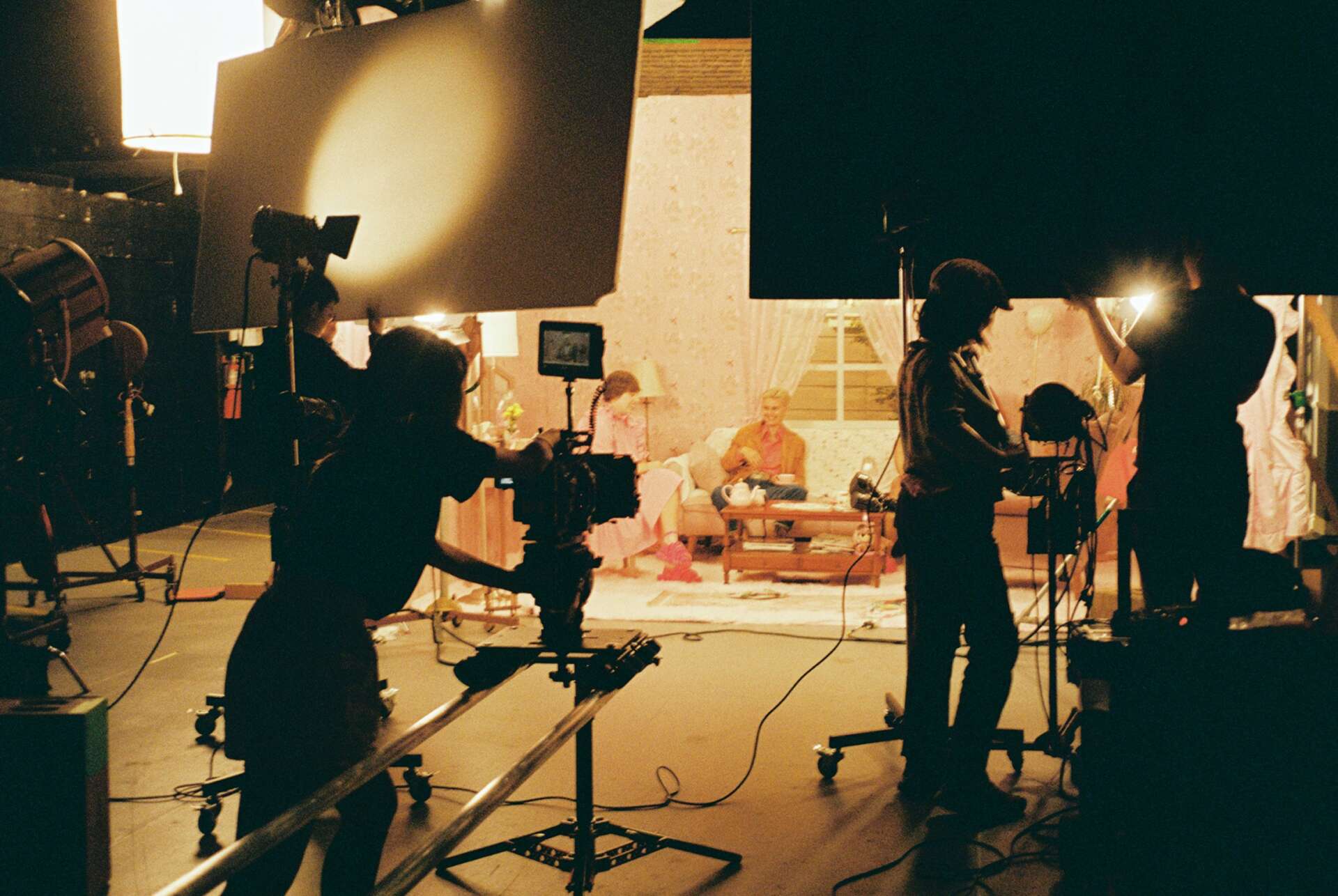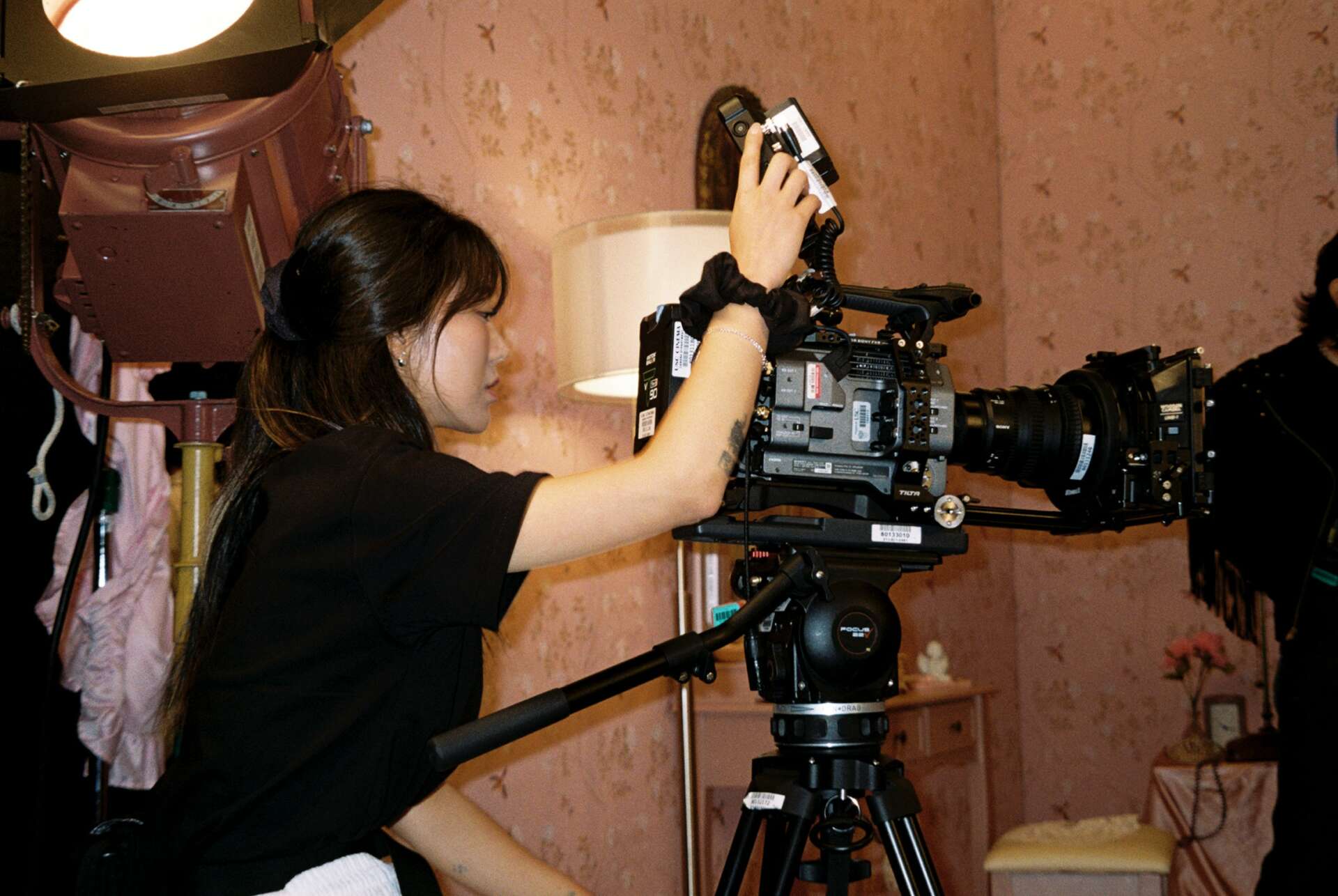We were lucky to catch up with Ji Lee recently and have shared our conversation below.
Ji, thanks for taking the time to share your stories with us today We’d love to hear about when you first realized that you wanted to pursue a creative path professionally.
A vivid memory I have from childhood is at the playground around dawn. I was about 8 years old. Most kids left. To home where a cup of cool milk and bread is awaiting, and to after-school classes and piano lessons. But I was still there, a thin tree branch, on one hand, drawing an interaction between two girls on the sand. I was explaining as I was drawing what they were talking about. The girl on the left sits down and starts crying, and the girl on the right sits down together with the crying girl, and she watches and listens. The girl on the right hugs her, holds her hand, and helps her stand up. I drew moment by moment, erasing each one as I drew a new one. I think I wanted to tell a story. I wanted to make something that people would see listen and feel.
My teenage years have flown by; excelling at what society expects me to be good at was what drove me. I studied and studied, aimed higher, and pushed myself further and further until I was burnt out. Not much of me was left. I was 16.
On a freezing winter day, I came home from school. The sun had already disappeared by then. I couldn’t make myself sit at the desk, so I lay in bed and turned on a movie on my laptop. I played a film titled Glasses directed by Naoko Ogigami.
Still to this day, I can’t shake off the feeling I got watching the film; I was in a quiet, small room by myself, but I was taken into a new world. The world where people have no concerns or worries. Where enjoying the present seems to be the only thing that matters. Where the whole world is painted with blue: blue sky, blue ocean. The protagonist was eating a perfectly shaped shaved ice with bright blue syrup poured on top under a hot sun.
The film was not trying to teach any lessons or deliver any messages, but I realized one of the most important things in life through that movie: how beautiful it is when someone knows how to enjoy living in the present. It’s a quote told every day, but it never touched me. I was always chasing my next goal and running towards the future. But the film made me think about what life looks like, and I realized it for myself.
And I knew then, that this is what I want to do in life. Pour myself into creating a powerful piece of art, an art of storytelling.



Ji, before we move on to more of these sorts of questions, can you take some time to bring our readers up to speed on you and what you do?
I knew I wanted to be an artist and a storyteller, and my love for camera and film as a medium has only been growing during my teenage years. I wanted to tell stories about our society and the people in it. I decided that to become a storyteller, I need to study about society and subjects first. Hence, I pursued Sociolgy as well as business administration in undergrad at Ewha Womans University in Seoul, Korea. I chose Women’s University as I wanted to tell stories of women and gender minorities. And Ewha being the first educational facility for women in Korea, I was attracted to the school. During my undergrad years, I intensely studied feminism and sociology extensively, and the things I learned became inspirations for stories. I started to write short scripts about gender inequality, addiction, and other lives of minorities.
In my freshmen year, I also joined a production crew. It was a team of young and passionate college students with no background experience in filmmaking. But together, we could do anything; everything was eye-opening and any opportunity that fell in front of us, we would take it. In a year, it grew into a production company. We shot short films and music videos. We also collaborated with well-known brands and made viral content. We stepped away from conventional ad content and tried things that had never been tried before. The short-form content we created hit a million views, and we were able to generate profits. Eventually, I became one of the managers and led the team.
This experience helped me see what I like in filmmaking. I decided to pursue editing as well as writing and directing. I started my journey pursuing a Masters in Film & TV Production at USC. I directed a one-minute short film as my first project at USC. Titled “When You Breathe the Air”, the film is about how dreamy yet heartbreaking romantic love between two women can be. The film was featured in festivals including the Seoul International Pride Film Festival. It was my first time getting into a film festival, and it meant the whole world to me. In the next film I directed called “A Humming Cloud”, I touched on loneliness and isolation. It won The Best Short Film and Best Performance in Feminist Media Festival. I have directed three more short films, which are currently in post-production. “In Your Eyes, In My Eyes”, touches upon body dysmorphia and queer relationships. “Grape Body” is a short film dedicated to women who suffer from body image issues. It introduces a girl who suffers from an eating disorder, meeting an elderly woman with a sick body. The latest film I directed is titled “All of Our Time”. It is a story about a lesbian couple debating whether they can be good parents or not; it touches upon internalized homophobia as well as society’s perception of queer people as parents. I hope to continue creating queer content and tell stories about women.
Aside from telling my own stories, I found joy in bringing other filmmakers’ visions through editing. As an editor, I get to provide a new perspective and different ideas to the film, which can take the film to a new place where even the director had not even thought of. This possibility excites me and motivates me. Sharing each other’s visions and molding the film together in the cutting room is one of the most magical things I’ve experienced ever since I started to pursue filmmaking. I have edited about 20 narrative short films at USC. One of my proudest works is a psychological horror short film titled “Seraphim”. Seraphim is a story about religion and standing up for what you believe in. I truly enjoyed every process through editing the film and learned an incredible amount as it was one of my first capstone-level projects to edit. The film won a Jury Award at Austin Film Festival and was selected at numerous film festivals including Horrorfest Film Festival, Fine Cut Festival, and more. With this project, I was lucky enough to win the First Look Faculty Award for Outstanding Achievements in Editing.
Currently, I am editing a narrative feature film for the first time. I’m beyond grateful for the opportunity. I am growing and learning every day. I hope to continue to meet unique and important stories. I also am looking forward to editing a documentary; I recently participated in a short documentary titled “Girly”, which explores the word “Girly” through a queer perspective, as a cinematographer. It was an incredibly humbling experience and it opened my eyes to the world of documentary.


For you, what’s the most rewarding aspect of being a creative?
To me, creating art is a reward in itself. While writing a script, meeting the crew and cast, shooting, and editing a film, I learn so much about myself and the topic that I become a different person after completing each project. I don’t think anything else can enlighten me in the way that creating art does. The most important thing I value in life is living truthfully and sincerely. I wish to live every moment fully and learn and enjoy everything along the way. And filmmaking lets me. Because without passion and sincerity, no film or any other form of art will have a heart. And a film, an art without a heart is no art.
What gives me butterflies is when the film I make makes someone feel better about themselves and feel less alone. This brings me back to why I decided to pursue filmmaking. Films consoled me like nothing did. It inspired me and set the direction for me. And therefore, when the films I make do something similar to other people, it gives me butterflies and makes me jump. Recently, I had one of my colleagues watch a cut of “Grape Body”, a short film I directed last year that is currently in post-production. She told me that she had the same thoughts as the protagonist and she felt not alone. Her eyes teared up as she was telling me. At that moment, I told myself, wow, I need to keep doing this. I think these encounters are the most thrilling part of being a filmmaker. It motivates me to go further and make more films that can reach more people.


Is there mission driving your creative journey?
I always say, I hope my films can be like a warm blanket to someone. Making something like a cozy and soft blanket is my goal in my creative journey. I wish to continue to pour my heart into films, and those films with heart reach people’s hearts. I want to wrap those having a hard time in a fuzzy blanket and keep them warm and safe during the dark and lonely times until a sunny morning comes to visit them. When they unwrap themselves and step into the sun, I hope they are more confident and content with themselves.
Bringing more stories of women and social minorities is also a mission I keep inside my heart. I have been trying to make films that tell those stories, and many of my works are women or queer driven. The documentary titled “Girly”, as well as short narrative film “Only the Lovers”, “Grape Body”, “In Your Eyes, In My Eyes”, and “All of Our Time” all dive into stories of women and queer. I am proud to have brought a lot of feminist stories, and am looking forward to continue this path. I grew up in a world where I could not find any films that made me feel like I belonged. I remember many nights of a long and lonely search for content I yearned for with no fruits found. I want to make those fruits for young girls, women, queers, and minorities.
Contact Info:
- Instagram: Instagram.com/chicchic.ll
- Linkedin: https://www.linkedin.com/in/jileeblue
Image Credits
Photo by Adeline Wang


